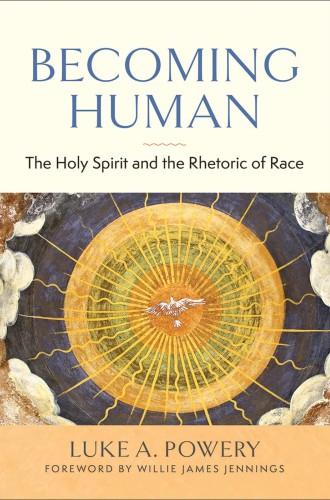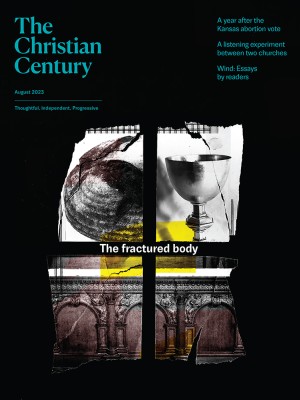Luke Powery preaches through and beyond racism
The Duke Chapel dean writes as if the Holy Spirit makes all the difference for faithful preaching—and anti-racism.
Becoming Human is a small book that proffers a big push. Many books on America’s racialized past and present, even those written for the church, are sociological, psychological, or political rather than theological in their analyses and remedies. The White-dominated church is rightly presented as a collaborator and baptizer of White supremacy, but the church (and by implication, God) is the problem rather than part of the solution.
Luke Powery, teacher of preachers at Duke Divinity School and dean of Duke University Chapel, takes a different approach. He talks about race as if the third person of the Trinity makes all the difference for faithful preaching. Preachers will find strong encouragement in Powery’s charismatic determination to speak like a Christian into America’s racial crisis and to have us do the same.
Read our latest issue or browse back issues.
Reconciliation of people may be what God wants, and Powery knows that there’s no reconciliation without truth telling and truth receiving. Other scholars have told the truth about our racialized culture, but few have told it as beguilingly and as accessibly as Powery. In a few pages, he deftly shows that while race has no biological reality and therefore is “empty of theological substance and support,” still, as a social construction, White racism is an idea that powerfully shapes the world. Racialization is what White Americans perform on others who are not like us. We baptize Whiteness, enthralling us to power configurations that are not only social and political but also religious—which makes the church deeply complicit. Few theologians have traversed this terrain as adroitly as Powery, and none as pneumatically.
Along the way, Powery takes some well-deserved swipes at modern universities and their chapels. At Duke Chapel, all of the statues that welcome worshipers are renditions of White men. Powery celebrates the removal of Robert E. Lee from his church’s front door, but he knows that it didn’t fundamentally change things. Our intellectual and theological structures of racism are so deep, and our resilient White supremacy so infinitely adaptable, that the removal of a statue is only a gesture. But it’s a start. Perhaps all the church’s anti-racist gestures, all adaptations of the way we talk about the racial divide, all sermons that attempt to name Whiteness are aspirational, prompts from the Holy Spirit that nudge us closer to where God intends to take us.
About a third of the way into the book, Powery invites “the Spirit to come and blow racialization in another direction.” After a full citation of Acts 2, he launches into a commentary on White supremacy as an offense against and resistance to the Holy Spirit—and a joyful celebration of the Spirit as faithful preaching’s source and agent. At Pentecost, separated humanity began to be regathered and re-created by the insurgence of the Spirit. While the Spirit has often been treated by theologians as an afterthought or rendered into subjective personal experience, Powery, a self-described Bapticostal, boldly calls the Holy Spirit into the racial crisis, thus putting pneumatology and Whiteness into conversation. Blending historical analysis with deeply personal experience, he demonstrates his conviction that “the Holy Spirit is the pedagogy of the human race.”
In his foreword to the book, Willie James Jennings notes that the Holy Spirit is “a verb,” the name for God’s “constant being here and there with us.” While racialization deprives humanity of being human together, the Spirit is a relentless humanizer who finds us even in our racism.
Noting that in Acts 2 Peter doesn’t preach until after the Spirit has descended, Powery gives a succinct exposition of the Spirit’s descent as the agent of faithful preaching. To fail to preach into America’s racial crisis is to preach as if God, in the power of the Holy Spirit, is an irrelevant, pious fiction. Part of the power of Becoming Human comes from the fact that Powery preaches or leads worship nearly every Sunday, doing the Spirit-filled reconciling work that he advocates.
Powery cites my 2017 book, Who Lynched Willie Earle? Preaching to Confront Racism, which aims to help preachers to preach about and against racism. But he adds that we need the dynamis, the Spirit, to enable us to move on toward “preaching through and beyond racism.” While he agrees with me that we must not grant our racialized differencing sovereignty, Powery also insists (in his unfailingly irenic spirit) that this won’t happen without external empowerment. Want to knock down America’s racial divide? Pray an epiclesis: bring it on, Holy Spirit!
Yielding to the “Spirit of God is dangerous and sometimes frightening work,” Powery warns preachers. And yet, there’s a cost to be paid for not assuming this daunting task. White preachers like me tend to note those who are upset by our sermons that mention race—while failing to count all those who, because we failed to speak up in the power of the Spirit, assume that the God we preach is no match for America’s original sin.
If you too are a White pastor who wants to catch up on the current discussion about the racialized church and the way our pulpit rhetoric has been influenced by White supremacy, Becoming Human offers an accessible, efficient way to do that. But I expected Powery to provide more specific guidance for talking like Christians about America’s racial crisis. Sure, my sermons need more reliance upon and greater empowerment by the Holy Spirit, but how should that actually work? It would have been helpful to see some specific examples of the good that a preacher can do when under the influence of the Spirit.
But maybe Powery would respond by reiterating that the Holy Spirit is a gift: grace. The Spirit’s work in a preacher is miraculous: unpredictable, unconstrained, not on demand. To pray an epiclesis before reading and preaching scripture is to pray for the courage to let the Spirit work and say to God’s people whatever God wants them to hear—whether they, or the preacher, like it or not. So rules, models, templates, and guidelines are out of place in a true pneumatology of preaching.
Besides, our racism is systemic and long-term. We didn’t get into this overnight, and nobody’s good examples, rhetorical stratagems, or clever sermons will get us quickly and easily out. Powery urges us simply to speak up and speak out in our time and place, applying the best wisdom we can, going to the Holy Spirit empty-handed, thankful that the Spirit’s work is eschatological, confident that our homiletical limits don’t stump the Spirit’s work.
Thus Powery ends his Spirit-instigated book with a rhetorical question rather than exhortation or explanation. “Can we move beyond and through racialization to humanization, in the power of the Spirit?” Because of the way the Spirit works, “our answer should always be: ‘O Lord God, you know.’”







